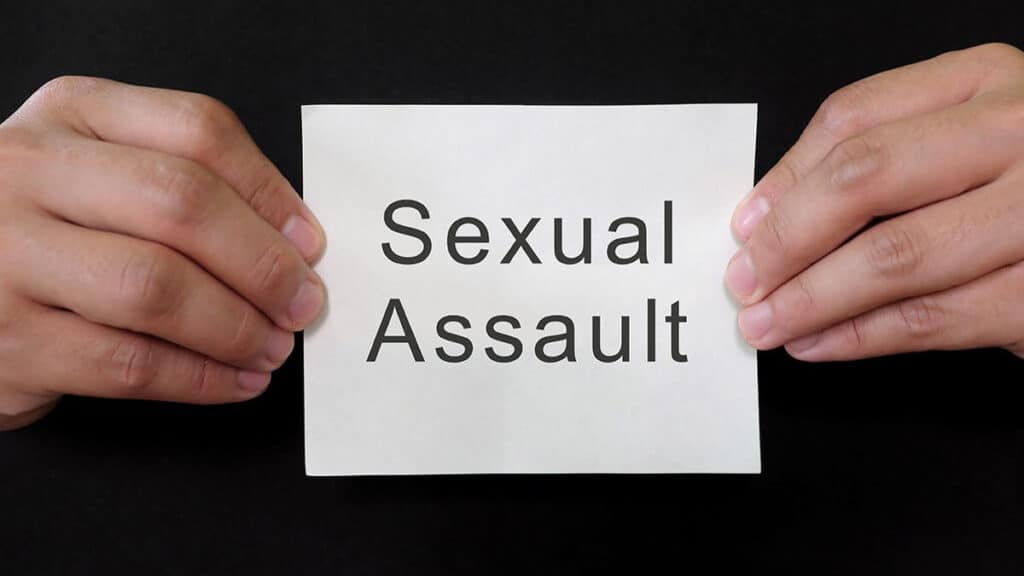Sexual assault charges
In Victoria, sexual assault is an indictable offence under section 40 of the Crimes Act 1958. Sexual assault carries a maximum penalty of 10 years imprisonment.
A person commits sexual assault if they intentionally and sexually touch another person without that person’s consent while not reasonably believing that the touching is consensual. For specific information on consent law related to sexual offences, see ‘Consent: Sex Offences‘.
The elements of sexual assault are similar to rape, with the primary difference being that the prosecution does not need to prove that penetration occurred.
The offence of sexual assault was previously known as indecent assault until 2015.
Have you been charged with sexual assault?
If you have been charged or if the Victoria Police want to interview you in relation to a sexual assault, call an experienced sexual assault lawyer before participating in a record of interview.
Whether to comment on your recorded interview requires careful consideration and has serious implications. What you say can be used against you in court and could be the difference between being found guilty or not guilty. Contact us today so we can support and advise you to achieve the best outcome for your circumstances.

Elements of sexual assault
Under the Crimes Act 1958 (Vic) s 40, the prosecution must prove four elements beyond reasonable doubt for a jury to find a person guilty of sexual assault.
A person (A) commits the offence of sexual assault if he or she:
- Intentionally touched another person (B);
- The touching was sexual;
- B did not consent to the touching; and
- A did not reasonably believe that B consented to the touching.
(1) Intentional touching
The first element relates to the voluntary act of intentional touching. An accused engaged in the act voluntarily if the act was within their deliberate control and direction (R v Falconer).
Touching is defined in s 35B as occurring in circumstances where the accused has touched the complainant:
- With any part of their body; or
- With anything else; or
- Through anything, including anything worn by the person doing the touching or by the person touched.
(2) The touching was sexual
Touching may be sexual due to (s 35B):
- The area of the body that was touched, including the genital or anal region, the buttocks or the breasts;
- The fact that the person doing the touching seeks or gets sexual arousal or sexual gratification from the touching; or
- Any other aspect of the touching, including the circumstances in which it is done.
The definition of sexual touching is synonymous with what was previously called indecent touching in the law of indecent assault in Victoria from 1958 to 1 July 2015. Although there are differences in the new offence, the fundamental elements of sexual assault remain the same. The extensive body of case law regarding indecent or sexual touching remains applicable to the current offence of sexual assault.
(3) Without consent
For an accused person to be guilty of sexual assault, the prosecution must prove beyond a reasonable doubt that the alleged victim did not consent to the sexual touching.
Since recent reforms implemented on 30 July 2023, consent is now defined in s 36 as ‘free and voluntary agreement’. This definition is qualified by the following:
- A person does not consent to an act just because they do not resist the act verbally or physically; and
- Just because a person has previously consented to previous sexual behaviour (whether the same or different) does not mean that they consent to further behaviour.
See ‘Legal definition of consent‘ for more on consent and circumstances in which a person does not consent.
(4) No reasonable belief in consent
Lastly, the prosecution must prove, beyond reasonable doubt, that the accused “did not hold a reasonable belief” that the victim or complainant was consenting to the sexual touching.
This element will be satisfied in the following scenarios:
- The accused did not believe that the complainant was consenting, including if the accused did not turn their mind to the question of consent; or
- The accused believed that the complainant was consenting, but it was not a reasonable belief in all the circumstances (such as if the accused did not say or do something to ascertain consent).
Under the Crimes Act 1958 s 36A, the accused’s belief is unreasonable unless they actively do or say something to determine whether the other person consents. If a Magistrate or a jury (for a matter heard in higher courts) finds that the accused held a reasonable belief that the complainant was consenting, the accused must be found not guilty of the offence.
Exceptions and defences to sexual assault
False Accusations & mistaken identity
A defence can be established to sexual assault if the defendant did not sexually assault the complainant and a false or mistaken accusation was made.
Issues of mistaken identity or false accusations against persons can be challenged during cross-examination of the complainant in committal proceedings or at jury trial.
Consent as a defence to sexual assault
A defence to sexual assault may be established if the complainant or victim consented to the sexual act. Verbal or nonverbal cues may indicate consent, but both parties must consent enthusiastically, and consent must be ongoing, with mutual understanding of the sexual behaviour intended.
Circumstances surrounding the issue of consent are addressed in s 36A and s 36AA of the Crimes Act 1958.
For further information, see ‘consent as a defence to sex offences’.
Reasonable belief in consent
A defence can be established if there is evidence that the accused held a reasonable belief that the complainant was consenting to the sexual touching.
For example, if the accused did or said something to determine whether the complainant consented within proximity to the sexual act, the accused is considered to have held a reasonable belief in consent. Therefore, even if the accused wrongly believed the complainant consented, if the belief is reasonably held in the circumstances, there is a valid defence.
The accused’s cognitive impairment or mental illness
An accused person with a cognitive or mental impairment (other than the effects of voluntary intoxication) that causes them not to say or do something to determine whether the complainant consents may have a valid defence under s 36A.
The presence of a cognitive impairment affecting an accused’s capacity to determine whether the complainant consents must be proved by the accused on the balance of probabilities for this defence to be available (s36A(4)).
The accused did not consent to the sexual touching
A defence to sexual assault may be established under s 50H if the accused did not consent to engage in the touching. This situation may arise if the defendant engaged in the sexual act under force, threat or fear of bodily harm or if the act occurred while involuntarily intoxicated with drugs or alcohol (such as if their drink was spiked).
Exceptions for medical procedures
Exceptions to the offence of sexual assault and compelling assault by sexual touching apply if the act was performed in the course of a procedure for genuine medical or hygienic reasons (s 48A).
A mistaken belief that the touching was not sexual
It is not a defence to a charge of ‘sexual assault’, ‘compelling assault by sexual touching‘ or ‘sexual activity directed at another person‘ if the accused was under a ‘mistaken but honest and reasonable belief that the touching was not sexual’ (section 48B of the Crimes Act 1958).
Consent and intoxication in sexual assault
The directions in relation to how a jury can assess an accused person’s reasonable belief in consent have been overhauled since 2017. Under the Crimes Act 1958 s 36B, it is clear that a jury cannot consider the accused’s intoxication (unless it was not self-induced) when assessing reasonable belief in consent. Instead, the jury must objectively consider whether the accused’s belief was reasonable from the perspective that the accused was sober at the time of the offending conduct.
There are also circumstances in which the complainant’s level of intoxication may render them incapable of consenting to a sexual act, such as if they are incapable of giving free and voluntary agreement or are incapable of understanding the nature of the act intended (s 36AA). These are just two examples of how the law concerning “reasonable belief” has been restricted in favour of the prosecution.
Sexual assault and the court process
Sexual assault is an indictable offence typically dealt with in the County or Supreme Court of Victoria. However, for sexual assault charges (not including rape), a summary jurisdiction application can be made to keep the matter in the Magistrates Court. This may be beneficial to avoid standard sentencing provisions.
See ‘Sex Offence Jury Trial Process‘ for more information about the sexual assault trial process.
Penalties for sexual assault
Sexual assault is an indictable offence with a maximum penalty of 10 years imprisonment (Crimes Act 1958 s 40). Maximum penalties are reserved for the worst cases, such as an aggravated sexual assault that is especially cruel, carefully planned, or motivated by prejudice and hatred (Sentencing Advisory Council).
In the Magistrates’ Court, the most common sentence for a charge of sexual assault was a community correction order (35.5% of charges). In the higher courts (the County Court and the Supreme Court), the most common sentence for a charge of sexual assault was imprisonment (70% of charges). The shortest prison sentence was less than 1 month, and the longest was 8 years (Sentencing Advisory Council, SACStat).
Range of sentences imposed in higher courts
2.5-year community correction order (DPP v Jordan [2015])
During a birthday party hosted by a mutual friend, a 16-year-old victim rejected the advances of the 19-year-old offender. The offender persisted with touching and kissing. On one occasion, he made her masturbate him, telling her she could not leave a room unless she did so. The offender pleaded guilty and was assessed as at low risk of reoffending.
9-month suspended sentence (DPP v Parker [2015])
In the early 1990s, the offender, then aged 51, sexually assaulted his 16-year-old nephew while under his care. He masturbated the victim (9-month sentence) and again sexually assaulted him a few weeks later (20-month sentence). The offender had been sentenced for other sex offences in the 1990s but had not since offended. He pleaded guilty.
4.5-year prison sentence (DPP v Ryan [2018])
A registered sex offender attacked a 22-year-old victim walking to her local gym. The offender covered her mouth and nose, dragged her to the ground and touched her vagina before running when she screamed and bit his hand. The offender had previously been sentenced for assault with intent to rape. He pleaded guilty.

Why you need a sexual assault lawyer
Sexual assault is a serious indictable offence carrying a maximum penalty of 10 years imprisonment. Sexual assault matters are complicated, and it takes an experienced sexual assault lawyer to navigate the pitfalls when being prosecuted for serious sexual offences.
Sexual assault and sex offences generally have been subject to many amendments concerning consent, penalties and criminal procedure. The Victoria Police have specialised units to investigate allegations by sexual assault victims, and the Courts have specialist lists to manage these matters.
Furthermore, sexual assault trials can be very complicated, and an experienced sexual assault lawyer with a comprehensive knowledge of the procedural requirements is critical to successfully defend sexual assault charges and navigate this complex area of law.
For an example of a case handled by our sex offence lawyers, see our sexual assault case study.
For more information, see our sex offences page.

























